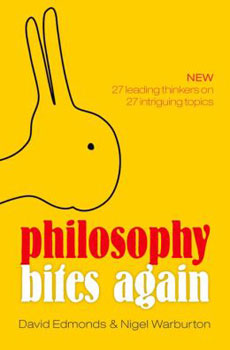"Nigel Warburton: So that's children. I can understand why they need to discover how the world works. But as adults, do we still need imagination in the same way?
Alison Gopnik: We don't need imagination in quite the same way — and we don't indulge in imagination as much as children. But when we're in the same position that children are in, trying to figure out new things about the world or create new ways of thinking about the world, then that's exactly when imagination kicks in. You could think about drama or fiction as serving the function of telling us about what the consequences would be of what look like very unlikely probabilities. But what's interesting about human beings from an evolutionary point of view is that we're always exploring very, very low probability hypotheses. And in fact we take things that start out being very unlikely and we actually make them real. So, if you look around this room that we are in right now and think about it from the perspective of a hunter-gatherer in the Pleistocene, everything is imaginary. Not just the computers and the light bulbs, but also the woven fabrics and the right angle construction of the tables. From the perspective of the Pleistocene, all those things started out as a very, very weird strange idea in some guy's head: 'Gee, what would happen if we did this?' The 'Gee what would happen if we did this?' is the central question that causal cognition and causal thinking allows you to address.
"NW: The process of imagining something and bringing it into reality assumes that the hypothesis or imaginary situation can be brought into reality. But lots of imaginary situations will be wasted, as it were. They will be explorations which fall by the wayside because they are just unrealizable in reality.
"AG: Well, the difference between children and adults is that the children don't actually have to do anything. A great evolutionary mystery is why humans have this extremely extended period of childhood when, to be blunt, children are completely useless. They don't bring home the bacon, they don't do anything useful; in fact, they're worse than useless because we have to put in so much time and energy taking care of them. And the answer seems to be that there's an evolutionary division of labour. We have this early period in which we can simply explore alternatives, learn as much as we can about the world around us, create and imagine new possibilities, without being under the constraints of needing to get on in the world, and doing the things we need to survive. And then what happens is that as adults we can take all of that exploration and learning that we did as children and put the products of that to use to actually make things happen in the world. So you could think of it like this: evolution has designed children to be the research and development division of the human species and we adults are production and marketing."
